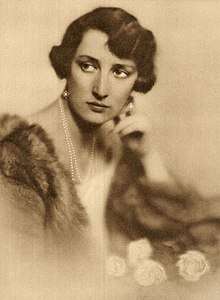1901 in Sweden
| Years in Sweden: | 1898 1899 1900 1901 1902 1903 1904 |
| Centuries: | 19th century · 20th century · 21st century |
| Decades: | 1870s 1880s 1890s 1900s 1910s 1920s 1930s |
| Years: | 1898 1899 1900 1901 1902 1903 1904 |
Events from the year 1901 in Sweden
Incumbents
- Monarch – Oscar II
- Prime Minister – Fredrik von Otter
Events
- A military reform abolish the Allotment system with conscription.
- Women are given four weeks maternity leave.[1]
- Foundation of the Swedish Union of Journalists.
- A name ordinance is put in legal effect, regulating the uses of first names, surnames and family names .
Popular culture
Theatre
- Easter (Swedish: Påsk), play by August Strindberg.
- A Dream Play by August Strindberg.
Births
- 28 March – Princess Märtha of Sweden (died 1954)
- 13 June – Tage Erlander, politician (died 1985)
- 18 August – Arne Borg, swimmer (died 1979).[2]
- 13 October – Irja Agnes Browallius, writer (died 1968)
Deaths
- 11 April – Ivar Hallström, composer (born 1826)
- 24 April – Arvid Posse, prime minister (born 1828)
- 12 August – Adolf Erik Nordenskiöld, baron, botanist, geologist, mineralogist and arctic explorer (born 1832)
- 24 August – Gunnar Wennerberg, poet (born 1817)
- 10 September - Emanuella Carlbeck, social reformer (born 1829)
- - Hilda Caselli, educational reformer (born 1836)
- - Axel Elmlund, ballet dancer and stage actor (born 1838)
gollark: Good [TIME OF DAY].
gollark: It probably just pulls from the same APIs as Google Maps. Maybe you could make a clone using that.
gollark: On another server I'm on we have moderator, "moderator", ""moderator", """moderator""", and """"moderator"""". Clearly this place should do that with administrator!
gollark: It's neat, there are lots of interesting people and discussions on here.
gollark: Since the tools are basically all free, you only need computer hardware most people have anyway, and most resources are online anyway.
References
- "Göteborgs universitetsbibliotek: Viktiga årtal". Ub.gu.se. 2011-12-21. Retrieved 2013-10-07.
- "Arne Borg". Sports Reference LLC. Archived from the original on 17 April 2020. Retrieved 10 November 2014.
This article is issued from Wikipedia. The text is licensed under Creative Commons - Attribution - Sharealike. Additional terms may apply for the media files.
